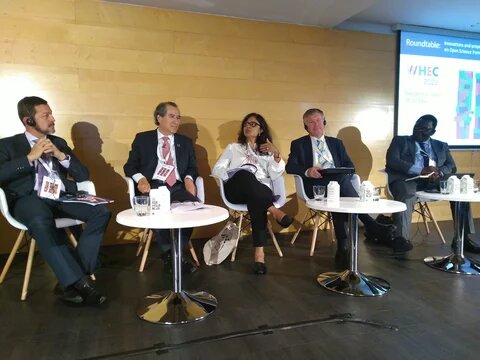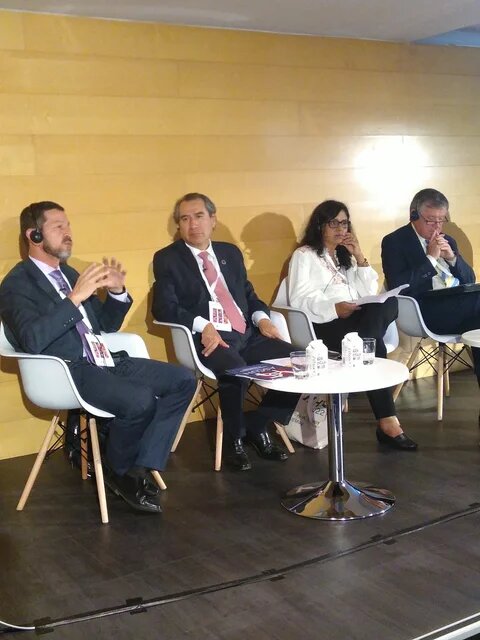The World Conference on Higher Education (WHEC) took place from 18-20 May 2022 in Barcelona with the aim of reframing the ideas and practices of higher education to ensure sustainable development for the planet and humanity. WHEC2022 aimed to break with traditional models of higher education and open the door to new, innovative, creative and visionary conceptions that not only serve current sustainable development agendas but also pave the way for future learning communities that overcome barriers, speak to all and are inclusive of all learners throughout life.
UNESCO kindly extended an invitation to the EU-LAC Foundation to organise a roundtable on Open Science at this Conference on May 19 on "Innovations and proposals for interregional cooperation in Open Science from a university perspective". This inter-regional dialogue gathered the following experts for an exchange of innovative experiences and approaches from Africa, Asia, Europe, Latin America and the Caribbean: Prof. Michael Murphy – President of the Association of European Universities (USA), Dr Oscar Domínguez – President of the Latin American and Caribbean Space for Higher Education (ENLACES); Executive Director of the Colombian Association of Universities (ASCUN), Prof. Olusola Oyewole – Secretary-General of the Association of African Universities (AAU), Dr Vidya Yeravdekar – Director of the Higher Education Section of the Federation of Chambers of Commerce and Industry – India (FICCI); Pro-Chancellor of the Symbiosis International University, India.
"Despite being one of the most scientifically advanced regions globally, implementing unhindered access to science remains a challenge in Europe," conveyed Professor Michael Murphy. In this respect, he also mentioned that citizens' participation in science in Europe remains low. Although there are economic and technological disparities between regions, this should not be an obstacle to cooperation, said Murphy. Removing barriers to greater access is essential, however, data protection and copyright laws must always be respected. Finally, he alluded to the importance of deliberately avoiding the publication of false data, which was widely observed at the height of the COVID-19 pandemic.
Dr Oscar Domínguez imparted a regional perspective from Latin America and the Caribbean and commented - in particular - on the Colombian situation, where a profound reflection on open science has been going on. He concluded that it is "information available to everyone that allows us to continue building, reinventing and solving problems". Along the same lines, Dr Domínguez stressed that universities are the main generators of quality information. Thanks to the efforts of universities to work together in alliance, they have managed to reduce the costs of negotiating for information and purchasing databases. In addition, he emphasised that the greatest force in open access is currently being generated by the Latin American research movement.
While open science does not imply open access, it will open the door to greater research collaboration and increased data sharing, which will build trust among researchers, as stated by Professor Olusola Oyewole. "The time has come to end scepticism about open science. It is time to open up research to participate in, and to make data available for decision-makers.” Prof Oyewole called upon eliminating boundaries in science to solve the global challenges of humanity. Nevertheless, trust among researchers in Africa is low - which makes sharing data in a responsible manner difficult – and much useful data is held in repositories within and beyond the region’s borders. Moreover, he argued that the concept of open science is still very new in Africa and barely developed, therefore, he urged the promotion of responsible regulation for the release and access of information, which would certainly facilitate regional cooperation.
Dr Vidya Yeravdekar initiated her presentation by highlighting India’s great disparities in access, not only to education but also to scientific information, depending on geography, gender and socioeconomic class. She said, "when we talk about open access and open science, you have to ask whether the data matters much if it is only for those in the labs and academia.” Dr Yeravdekar noted that governance and accountability issues must be well defined before cross-regional scientific cooperation can take place, agreeing that trust remains a major obstacle to open science. This is further complicated by the fact that different regions have different levels of technological and digital advances. The same gap is evident between developing and developed countries, where scientific infrastructure is more advanced in the latter than in the former.
The attendees of the event coincided that improved data sharing practices could end the duplication of research by scientists from different parts of the world. This would make data more readily available in established repositories, saving the costs and time involved in conducting research on a topic that has already been investigated and published.

